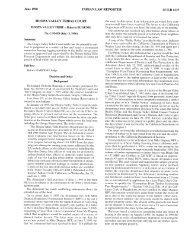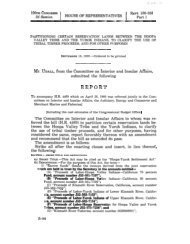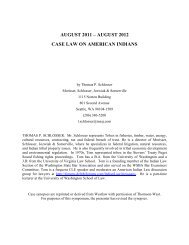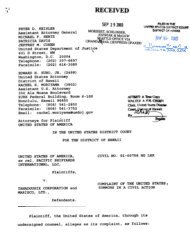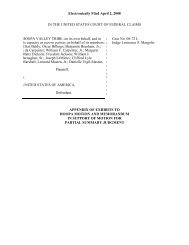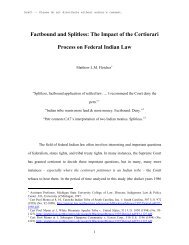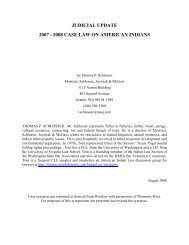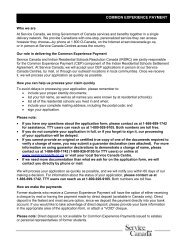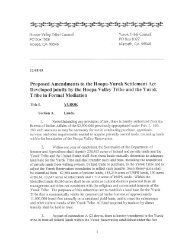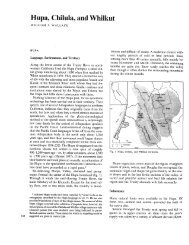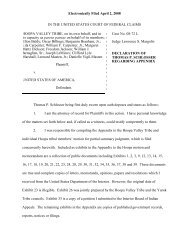Yurok Tribe's Motion to Dismiss U.S. Third Party Complaint
Yurok Tribe's Motion to Dismiss U.S. Third Party Complaint
Yurok Tribe's Motion to Dismiss U.S. Third Party Complaint
Create successful ePaper yourself
Turn your PDF publications into a flip-book with our unique Google optimized e-Paper software.
Case 1:08-cv-00072-TCW Document 39 Filed 11/07/2008 Page 10 of 16<br />
(emphasis added). That was what the Hoopa Valley Tribe did before receiving its share years<br />
ago, and it is what the <strong>Yurok</strong> Tribe did before receiving its share – it waived any present or<br />
future claim it “may have.” Congress imposed no time limit, nor did it adopt any provision<br />
aimed at punishing or depriving a tribe that did not immediately adopt a waiver. Thus, the<br />
Department was quite right that the Act mandated release of the <strong>Yurok</strong> Fund <strong>to</strong> the <strong>Yurok</strong> upon<br />
execution of a waiver. Even if it were not, the Hoopa Valley Tribe would still have no claim<br />
since it received all Settlement Fund monies <strong>to</strong> which it was entitled years ago. For those and<br />
other reasons briefed by the Government, the Hoopa Valley plaintiffs have no valid claim against<br />
the United States, so there is no contingent liability on which <strong>to</strong> base a third-party claim against<br />
the <strong>Yurok</strong>.<br />
B. Principles of Indian Trust Law Bar The Government’s <strong>Third</strong> <strong>Party</strong><br />
<strong>Complaint</strong><br />
Even if the Government had erred somehow in releasing the <strong>Yurok</strong> Fund <strong>to</strong> the<br />
<strong>Yurok</strong>, it would still have no third-party claim against the <strong>Yurok</strong> Tribe because such a claim is<br />
fundamentally at odds with the Government’s relationship as trustee for the <strong>Yurok</strong> Tribe. As<br />
trustee for Indian tribes, the Government’s actions must be consistent with its overriding<br />
fiduciary obligation <strong>to</strong> Indian tribes and individual Indians in the management of their resources,<br />
property, and affairs. United States v. Mitchell, 463 U.S. 206, 226 (1983); Short v. United States,<br />
719 F.2d 1133, 1135 (1983) (Short III);White Mountain Apache Tribe of Arz. v. United States,<br />
11 Cl. Ct. 614, 669 (1987), aff’d, 5 F.3d 1506 (1993). The United States is held <strong>to</strong> the "most<br />
exacting fiduciary standards.” Seminole Nation v. United States, 316 U.S. 286, 297 (1942); see<br />
also American Indians Residing on the Maricopa-Ak Chin Reservation v. United States, 667<br />
F.2d 980, 990 (Ct. Cl. 1981) ("The standard of duty as trustee for Indians is not mere<br />
reasonableness, but the highest fiduciary standards.").<br />
\\\DC - 024734/000003 - 2815011 v2<br />
10



